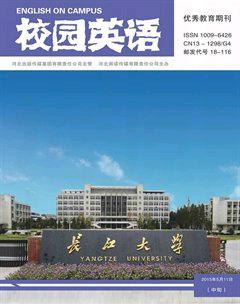ApplicationofPuninEnglishAdvertisements
TanLi
【Abstract】This paper illustrates the definition of pun,especially its features, as well as the typical application of pun in English advertisements in order to emphasize its importance in daily usage both for advertisers and to target readers.It aims to demonstrate the importance of grasping the gist of pun in English advertisements.
【Key words】Pun; Application; English advertisements
1.Definition and Features of Pun
As a common rhetoric skill,pun is used in varies of occasions,especially in English advertisements.Getting to know “pun” not only helps us to realize the English language expressions,but also improves our understanding of English culture,custom and social life.It can rouse our study interest and motivation as well as improve our level of reading comprehension and language appreciation.
1.1 The definition of pun.Pun is defined as the use of a word in such a way as to suggest two or more meanings or different association,or the use of two or more words of the same or nearly the same sound with different meanings,so as to produce a humorous effect.[1]
1.2 The features of pun.Pun is usually implicit and mild,vivid and active,humorous and interesting.With one expression,it can indicate,even imply more than one meanings.In this way can we feel its function of being interesting and meaningful.[2]Pun not only attaches importance to ambiguity,but also acts as a form of word game in which words or phrases combine two unrelated meanings.
2.Typical Application of Pun in English Advertisements
Pun is widely used in English advertisements with its seemingly implicit expression to impress consumers deeply,either with identical pronunciation or further extensive meanings.Therefore,it tends to stimulate peoples desire for shopping.
2.1 Analyze this advertisement: “The”in“idea in business travel—Hilton Inns”,in which “in” means “fashionable” and the advertisement told us a fact that coming to Hilton is the most fashionable choice.Its hidden meaning is that staying in Hilton Inn is like being at home,for you can enjoy considerable care.It is a classic instance of paronomasia.
Furthermore,an American optician advertise his product as “OIC”,which has the identical pronunciation of “Oh,I see!” This advertisement not only conveys the obviously seen joy of observing the world clearly with the aid of the glasses,but also leaves a deep impression on consumers.
Another application of a sunshine beach: “More sun and air for your son and your heir.”,which skillfully make use of two pairs of words: sun-son,air-heir,whose pronunciations are identical to each other to draw a cozy picture for the potential consumers and call on them there.
2.2 In addition,semantic pun in English advertisements is also commonly seen: “Money doesnt grow on trees.But it blossoms at our branches.” This is an outdoor advertisement of British Lloyd Bank.It implies that money and wealth does grow at Lloyd bank branches.In this case,consumers will be firmly persuaded to come to their bank for transactions.
Look at an advertisement for More cigarette: “Im More satisfied.Ask for More.” As the brand of cigarette,consumers tend to memorize the advertisement as well as the brand easily: ask for more “More” cigarettes.
Pun in some advertisements finds its root in cultural background,such as “Where there is a way,there is Toyota.” It follows the pattern of “When there is a will,there is a way.” But it makes consumers keep the brand “Toyota” in mind more easily.
2.3 Lastly,lets appreciate the advertisement for canned Coca Cola: “Coke refreshes you like no other can.” Here,“can” is a modal on the surface; on the other hand,it refers to the tin that contains Coca Cola.It indicates that Coca Cola is the most refreshing compared with other canned drinks.
3.Conclusion
Pun,as a unique rhetoric skill in English language,is universally applied in daily language,especially in English advertisements.Learning and grasping applications of pun in English advertisements will be helpful for our understanding the implication of pun as well as our comprehensive improvement of English level.
Reference:
[1]A S Hornby,Oxford Advanced Learners English-Chinese Dictionary[Z].Oxford University Press,1997, 9:1202.
[2]Dai Weidong, He Zhaoxiong[M].A New Concise Course on Linguistics for Students of English.Shanghai Foreign Language Education Press, 2002.

